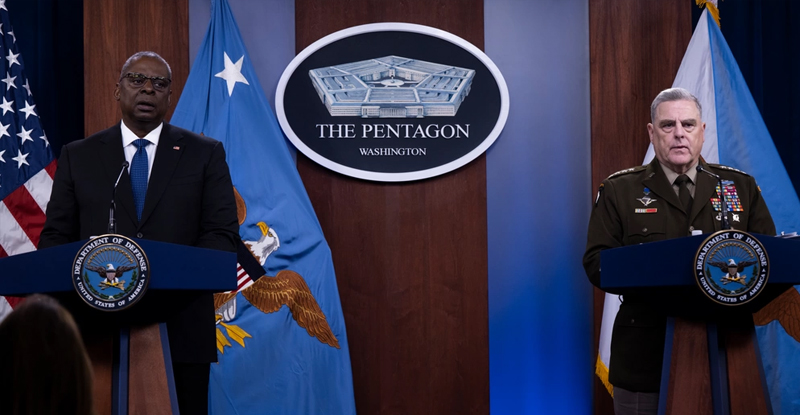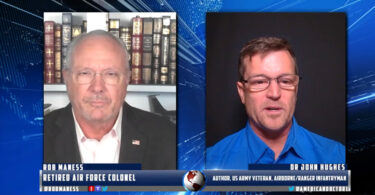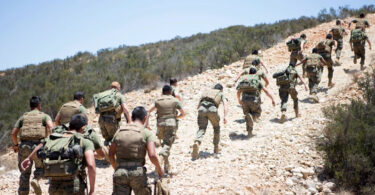By Mike Brest | Washington Examiner
A group of veterans upset with what they argue is the “indoctrination of our soldiers, sailors, Marines, airmen, and guardians,” reached out to Gen. Mark Milley, the chairman of the Joint Chiefs, in hopes that he will remedy the situation.
Stand Together Against Racism and Radicalism in the Services, a group that says it represents “thousands of veterans,” wrote a letter to Milley on Feb. 11, a copy of which was obtained by the Washington Examiner earlier this week.
One of the group’s major concerns is what they describe as the “indoctrination” of critical race theory, a decades-old concept that claims U.S. institutions were created to keep whites ahead of minorities, requiring the dismantlement of the existing system to achieve a fully just society.
The teaching of critical race theory constitutes a “grave national security issue,” they wrote, characterizing its teaching in the military services as “the infiltration and acceptance of racist and radical ideologies in our armed forces.”
“We find it inexcusable that the ‘woke’ political agenda has found its way into the military,” they wrote, arguing that critical race theory “segregates people by skin color into racial oppressors and those they oppress and presumes the legacy of past discrimination can only be remedied today by discriminating against the oppressors — whites.”
Col. Dave Butler, a spokesman for Milley, took exception with the “indoctrination” characterization in a statement to the Washington Examiner.
“Our military is a reflection of our society and therefore proudly diverse, though we are also lethal and effective,” he said. “We do not indoctrinate our service members: They are intelligent and independent thinkers. Any effort we make to build an inclusive and diverse force is an effort toward building effective combat power. We are laser-focused on the defense of our nation.”
At the core of the issue is a disagreement over whether the theory is taught in class and whether its core tenets have an underlying presence in academics. Back in July, Secretary of Defense Lloyd Austin insisted that some students at military institutions have been required to study material on the theory but claimed that it isn’t something the Defense Department espouses.
“You’ve heard me say that critical race theory is not something that this department teaches, professes, embraces. You’ve also heard a couple of people at academic institutions say that they have required this to be reading for their students in specific courses,” Austin said during a press conference with Milley. “But because that is the case does not mean that this department embraces this theory.”
The STARRS group disagrees with Austin’s assessment, writing, “Unfortunately, that is not accurate. The tenets of critical race theory are appearing in classrooms, guest lectures, training programs, and stand-down briefs.”
Their letter was signed by more than 50 veterans from various military backgrounds, though they are far from the only people who have expressed concerns with what critics describe as the liberalization of the military.
Retired Marine Lt. Gen. Greg Newbold, a former Joint Chiefs director of operations, reiterated many of the same points in an op-ed for Task & Purpose last week, accusing “our most senior politicians and military leaders” of having “a form of dementia when it comes to warfare” and said the subsequent result “is a dangerous and potentially catastrophic malady.”
“Indeed, the military wears uniforms because uniformity is essential,” Newbold wrote. “The tenets of Critical Race Theory — a cross-disciplinary intellectual and social movement that seeks to examine the intersection of race and law in the United States, but which has the unfortunate effect of dividing people along racial lines — undermine our military’s unity and diminish our warfighting capabilities.”
He and Butler made similar points, however, in one respect, with the latter noting, “The purpose of the United States military is simple: It is to protect and defend the Constitution of the United States of America against all enemies, foreign and domestic. And with that comes two key tasks: Prepare for war, and if deterrent fails, fight and win America’s wars.”
Butler’s statement did not specifically address critical race theory.
Many conservatives on Capitol Hill have spoken out about the claims of the teaching of critical race theory or specific tenets of it.
GOP Sen. Jim Inhofe, the ranking member of the Senate Armed Services Committee, said in a statement earlier this month that the military had dedicated nearly 6 million hours since the start of the Biden administration on “developing, preparing, delivering, attending or assessing” new plans to address climate change, diversity, and extremism.
The statistics were from the chairman, who provided them to the senator in a letter a couple of weeks ago. Members of the armed forces, Combatant Commands, and the Joint Chiefs spent 5.4 million hours on extremism, an average of roughly two hours per service member, and it “is comparable to other Joint Force periodic training requirements,” Milley explained, which came in as the most expensive and timely venture. It cost $535,000.
The chairman, during the hearing with Austin, gave an impassioned response as to why he believes it is important to teach cadets about various theories and philosophies, even those that are unpopular.
“I want to understand white rage, and I’m white,” Milley told the House Armed Services Committee. “I personally find it offensive that we are accusing the United States military — our general officers, our commissioned [and] noncommissioned officers — of being ‘woke’ or something else because we’re studying some theories that are out there. I’ve read Karl Marx. I’ve read Lenin. That doesn’t make me a communist.”
First published in The Washington Examiner








Leave a Comment